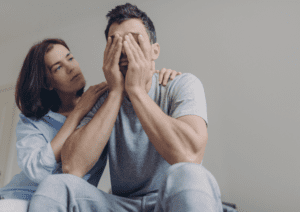Relapse Prevention: What Is It?
The goal of relapse prevention in Florida is to reduce the possibility or occurrence of relapse through the use of coping mechanisms, tools for recovery, and mindfulness exercises. Relapse prevention strategies can be tailored to your tastes.
In the end, relapse prevention involves more than just abstaining from drugs and alcohol. Learning new techniques and modalities for controlling our emotions and actions and substituting healthy habits for bad ones are key components of relapse prevention.

How to Substitute Negative Behaviors with Positive Coping Mechanisms
When creating a relapse prevention strategy, we should consider our routines. We can develop new, better routines around triggers or bad feelings that tend to provoke us when they occur. For instance, it would be advantageous to swap out any unhealthy habits we have (such as drinking, using drugs, or even just acting irritably) with better ones that soothe us if we experience anxiety whenever the mortgage payment is due. Typically, habit formation follows a set of steps:
Cue/Reminder: the catalyst for the behavior
Regular: the response to the prompt or reminder, and
Reward: the advantage derived from engaging in the action or activity
Mental health counselors in Florida can teach you to respond with new patterns by paying attention to the prompt or reminder. Instead of drinking or becoming agitated in response to the mortgage payment like we used to, we would now substitute a new pattern like calling our sponsor or going for a run. Healthy routines will automatically bring benefits and rewards, which will encourage our new behavior. It's time to consider a fresh response or habit if we are unable to identify the advantage or reward. These routines will help us stay calm and support our sobriety throughout time.
It might be worth making list such as:
The things I do that set off my triggers
The recurring events that set off my triggers
The rehabilitation practices that bolster my willpower on an emotional and spiritual level
Consider our Relapse Recovery Center in Florida
Then, a trauma recovery center in Florida such as New Era Therapy Now can help you associate the triggers with a desired behavior or pattern. We shall drink hot tea and read a book after every time we encounter a recognized trigger (or whichever routine you like most). We can develop coping mechanisms and grounding rituals for each of our stressors and triggers in this way.
Mindfulness-Based Interventions for Recovery from Addiction
Even more effective than treatment, mindfulness-based approaches have a remarkable impact on people in recovery, lowering cravings. And doing it is crucial to avoid any relapses. We may entirely rewire our brains by minimizing our appetites, concentrating on the here and now, and doing things that help us feel peace again.
The focus of mindfulness-based therapy and practices is the here and now. We remain still while paying attentive attention to our current thoughts and emotions without passing judgment. We don't attempt to address them or provide solutions. We merely concede to them. These ideas are a normal part of life; instead of responding to them or avoiding them, we should give them room to come and go.
During virtual psychotherapy, we can develop a strategy around our recurring ideas when we practice mindfulness and become accustomed to them. We may now add things to our trigger list if we sit and pay attention to our thoughts and notice a strong response to certain feelings or thoughts. And we can prepare our grounding strategies as a response.
Reach out to the best psychologist in Broward county for guided training if you'd want to learn more about mindfulness-based cognitive therapy or relapse prevention strategies. At New Era Therapy Now, we offer specialized Relapse Prevention Treatment in Florida and are located in Boca Raton, Parkland, Coral Springs, Miami Beach. Our experienced professionals have the knowledge and expertise to provide you with the support and guidance you need to achieve and maintain long-term recovery.
You can also learn about What is Cross Addictions Therapy?
